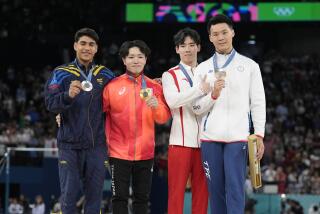COMMENTARY : Boxing Officials Were Worst Flaw
BADALONA, Spain â A few words about the Olympic boxing tournament and the much-discussed computer system that was used:
Although there were some very vocal critics of the computer scoring, basically it worked.
The computer identified the correct winner, with few exceptions. Nothing even close to the controversial decisions in the gold-medal bouts of Seoul occurred.
What didnât work was the International Amateur Boxing Assn. (AIBA), the world governing body for amateur boxing. Its officials went for the gold medal in arrogance.
Here is a sport that many believe might be kicked out of the Olympics in a few years. How does AIBA react to this threat?
Its members go out of their way to pick fights with the media.
For example, AIBA announced during the Olympics that it would hold a news conference with Arthur Tunstall of Australia presiding. Tunstall was extremely visible during the Olympic boxing tournament, strutting about the boxing arena in khaki safari suits and barking orders.
The kindest word the American delegation used to describe him is pompous.
First question to Tunstall: Why is it that AIBA wonât release the computer printouts to the media after each bout?
Answer: Youâll have to ask a member of the refereesâ and judgesâ commission. Next question, please.
Q: Wait a minute. Why are the printouts being kept a secret?
A: Theyâre not a secret. Next question, please.
Q: Why is it that the Ghanan judge, Keith Dadzie, was suspended for two days earlier in the tournament for incompetent judging, then was brought back into the tournament and worked the last three bouts in which Americans boxed?
A: Youâll have to ask a member of the refereesâ and judgesâ commission. Next question, please.
Q: Wait a minute. Why would you suspend a judge for two days for incompetent judging and then suspend an Irish boxer who kicked his mouthpiece for two years?
A: At all times, we are interested in the welfare and safety of the boxers. Next question, please.
And so it went.
Tunstall also announced that the U.S. protest over Eric Griffinâs controversial 6-5 defeat by Rafael Lozano had been denied, that the vote was unanimous.
Later, it turned out, two members of the executive committee had voted with the United States on its appeal.
âI didnât see their hands,â was Tunstallâs explanation.
A reporter asked for a rule book during the Olympics. Go to the AIBA office, he was told. And take $5. He was stopped at the door. AIBA members only, he was told.
âBut I just want to buy a rule book.â
âSorry.â
Finally, he gave $5 to Jerry Dusenberry, the only U.S. referee-judge here, who bought the rule book for him.
Of the computer scoring system, there was talk of expanding the time judges have to hit a button for a scoring blow from one second to 1.5 or two seconds. In virtually every Olympic bout, most of the scoring blows were not being accepted by the computer because at least three of the five judges didnât log the punches within the one second.
Presumably, AIBA was sensitive about this, and for that reason, did not release scoresheets. Media and spectators were provided round-by-round running scores and the country affiliation of the five judges and the referee.
Yet even when it protested the Eric Griffin decision, the U.S. delegation could not get a copy of the scoresheet.
Then there is the embarrassing matter of the new official AIBA headgear. Boxers who didnât wear a Top Ten helmet had to tape over the logo. The Top Tens were made in Germany--no surprise there, because Karl-Heinz Wehr of Berlin is the AIBAâs secretary-general--of rubber and have a sharp edge along the front.
Upon impact, the sharp edge becomes knife-like. There were far more cuts here than in the Los Angeles or Seoul Olympics. Even AIBAâs own medical staff is blaming the Top Ten headgear.
Next question, please.
More to Read
Go beyond the scoreboard
Get the latest on L.A.'s teams in the daily Sports Report newsletter.
You may occasionally receive promotional content from the Los Angeles Times.





